Melons are one of the most refreshing types of fruit. They are incredibly sweet, delicious, watery, and no one can refuse a slice of melon during the hot summer days!
Guinea pig owners might get tempted to give them a piece of this super-tasty fruit, so let’s find out if melons are good food for guinea pigs.
Can guinea pigs eat melons? Guinea pigs can eat melons, but they should eat them in moderation because of their high sugar content. Also, out of the entire melon, guinea pigs can eat the flesh (inside part), and often they will munch on the skin as well, but they can’t eat the seeds.
It is also essential to learn why this fruit is nutritious for them, and what risks it brings. So, in the following sections below, we will explain in detail why is melon safe for guinea pigs, what kind of melons can guinea pigs eat, and everything necessary regarding melons as potential food for our guinea pigs!
Table of Content
Are Melons Good for Guinea Pigs? | Health Benefits
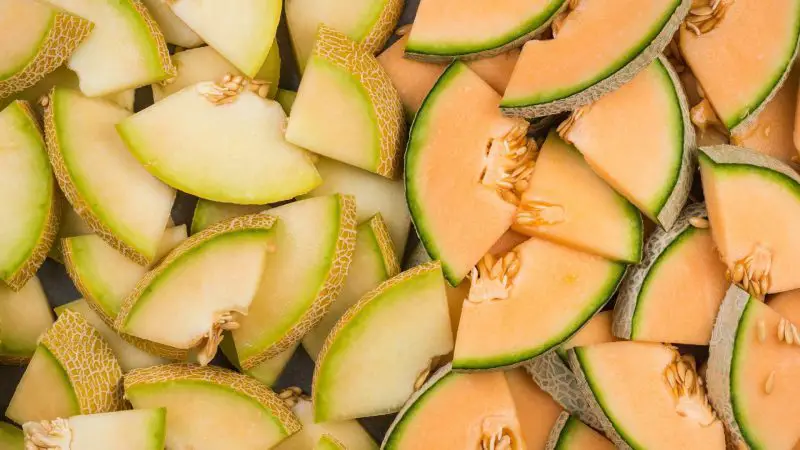
There are numerous health benefits that can be attributed to melons. Some of them are the following:
Healthy Weight
Because melon is low in fat and calories for a fruit, the little guinea pig will not get chubby or be at risk of obesity. Guinea pigs love to eat and they sometimes don’t know when to stop eating, so it’s important to provide them with a small amount of food that is low in fat and calories. This way the weight of the guinea pig won’t be affected.
Healthy Cardiovascular System
Your guinea pig’s cardiovascular system will stay healthy due to the zero amount of cholesterol in melons. Also, blood vessels will stay healthy because of the low amount of fat that will not clog them in the guinea pig’s organism.
There is vitamin K in melons that contributes to healthy blood clotting. This means if an injury happens (internal or external), there will be less blood loss.
Antioxidants
Vitamin A acts like one of the best antioxidants out there. It removes the free radicals that create damage to the body, such as early aging. This vitamin will also prevent many different diseases that can harm the health of guinea pigs.
Vitamin A improves eye health and overall immunity as well. Many internal organs will be healthier with this vitamin such as the heart, lungs, and kidneys above all.
Prevention from Scurvy
Vitamin C is a must-have vitamin for guinea pigs. Without this vitamin, they can get a disease called scurvy. The symptoms of this disease are swollen joints, internal bleeding, oral problems, loose stool, no appetite, and a rough coat. So it’s crucial to provide them with foods rich in vitamin C, and melons are one of them.
Healthy Organs and Muscles
B6 vitamin, which can be found in melons, has numerous benefits for guinea pigs. It cleanses the liver, cures anemia, removes aches and pains, improves eyesight, and reduces stress and anxiety. This vitamin is good for muscles, and guinea pigs will sleep like a baby because vitamin B6 also reduces stress.
There is also some magnesium in melons, which is mostly known for reducing any pains and aches and for protecting the overall health. The magnesium keeps all muscle tissues in good health, without pain or soreness, and this goes for the heart muscle as well.
Nutrition Facts of Melons for Guinea Pigs
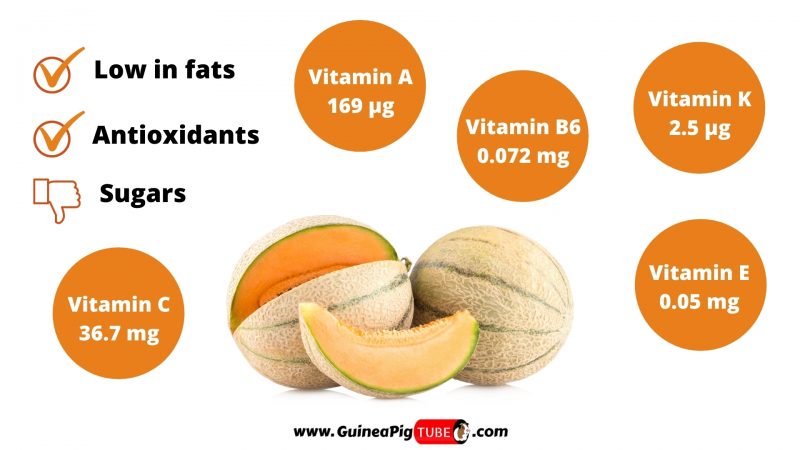
Nutrition information for 100 g (3 oz) of cantaloupe melon:
- Energy – 34 kcal
- Protein – 0.84 g
- Total lipid (fat) – 0.19 g
- Carbs – 8.16 g
- Dietary Fiber – 0.9 g
- Sugars – 7.86 g
- Calcium – 9 mg
- Iron – 0.21 mg
- Magnesium – 12 mg
- Phosphorus – 15 mg
- Potassium – 267 mg
- Sodium – 16 mg
- Vitamin C – 36.7 mg
- Vitamin B-6 – 0.072 mg
- Vitamin A – 169 µg
- Vitamin E – 0.05 mg
- Vitamin K – 2.5 µg
- Lutein + zeaxanthin – 26 µg
Is Melon Poisonous to Guinea Pigs? | Possible Risks
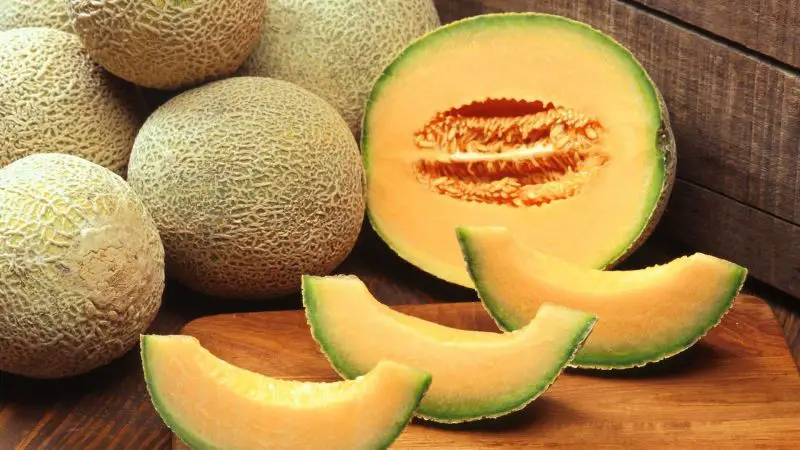
Let’s see what are the possible risks of giving your guinea pigs melon.
Bad Digestion
Melons might be delicious and hydrating, but they also have sugars. Guinea pigs don’t digest sugars well, and their stomachs are not designed for types of foods high in sugar and fat. If a guinea pig consumes more sugar, it will get loose stool or tummy pains.
Urinary Problems
The melon also contains some calcium, this mineral is necessary for very young guinea pigs that need to grow and develop. But, once the guinea pig is fully grown, calcium becomes harmful to them as it can cause many problems in the urinary tract of an adult guinea pig.
This mineral, if it deposits in the urinary tract will create kidney or bladder stones. Also, it may cause painful urination, blood in the urine, or persistent urinary infections.
Bacteria Risk
Unfortunately, melons and especially cantaloupe melons can contain some harmful bacteria such as salmonella on their surface. That’s because their rind is rough, and bacteria can easily get trapped there during growth and transport. So, when eating melons or feeding melons to guinea pigs, you need to be very careful.
It’s important to buy fresh melons that don’t have any damage on their rind. Always wash the melon thoroughly with water. Also, it’s essential to wash your hand, desk, and knives to decrease the contamination risk of the melon flesh. Lastly, always keep melons in the refrigerator.
Serving Size and Frequency of Melon for Guinea Pigs
Can Guinea Pigs Have Melon Every Day?
Guinea pigs shouldn’t eat melon every day because of the sugar and calcium content in them. They can eat only hay and pellets every single day, but fruits and vegetables need to be moderated.
Also, they need a versatile diet with different fruits and vegetables. It’s recommended to feed melon to the guinea pig 2 to 3 times per week. This way, you don’t need to think a lot about the possible risks we mentioned above.
Can Guinea Pigs Eat Whole Melon?
Guinea pigs can’t eat a whole melon because that quantity can be harmful to their stomach. As we have already said, there is a lot of sugar and calcium in melons, so you need to limit the servings to a few tiny melon pieces or cubes. For example, 2 to 3 very small cubes are enough. There are also other fruits that you can introduce in your guinea pig’s diet, such as watermelon, blueberries, strawberries, kiwis, grapes, and so on.
More Information About Guinea Pigs and Melon
There are many types of melons. In the following sections, you will find out if guinea pigs eat all types of melon and what parts of melon are safe for them. Let’s begin!
Can Guinea Pigs Eat Cantaloupe Melon?
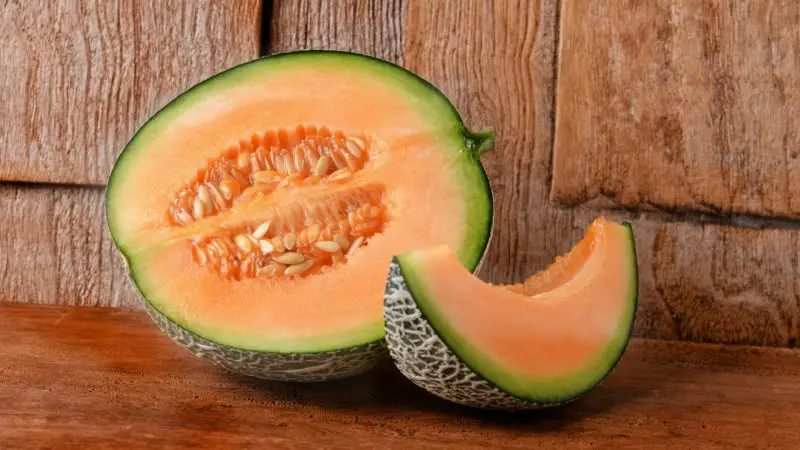
The cantaloupe melon is also known as a rockmelon, sweet melon, or spanspek. This fruit is very nutritious, delicious, and beneficial for health. Guinea pigs can eat cantaloupe melon. The most beneficial thing about cantaloupe melon is that this melon is rich in vitamin C (an essential vitamin for guinea pig’s health).
Nevertheless, due to the sugar and calcium content, cantaloupe melon should be fed to guinea pigs only in small serving sizes and not every day. Also, cantaloupe melon is known as the riskiest melon when we talk about bacteria on their surface, especially salmonella. So, be careful when feeding cantaloupe melons to guinea pigs.
Can Guinea Pigs Eat Honeydew Melon?
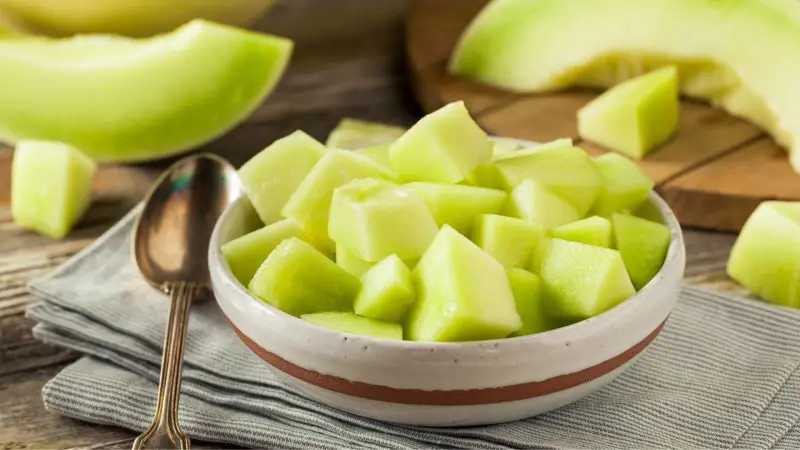
Guinea pigs can eat honeydew melon, but also only in moderation. Honeydew melon in some parts of the world is also known as a green melon. It has many nutrients that are beneficial to guinea pigs. However, if we compare honeydew melon with cantaloupe melon, we can say that cantaloupe melon is a healthier version for guinea pigs. This is because cantaloupe melon has double the amount of vitamin C and around 60% more vitamin A than a honeydew melon.
Be careful when preparing honeydew melon for guinea pigs. Give them only fresh honeydew melon and wash it well with water before serving. There is also the possibility of bacteria presence and different pesticides that can be harmful to guinea pigs.
Can Guinea Pig Eat Oriental Melon?
Oriental melon is also known as the Korean melon. Its flavor is described as something between a cucumber and honeydew melon. This melon that has white flesh and very thin skin comes from East Asia. Guinea pigs can eat oriental melons, considering that they are also rich in vitamin C and vitamin A. But, it’s essential to remember to only feed them in small quantities, a few slices, 2-3 times per week.
Can Guinea Pigs Eat Bitter Melon?
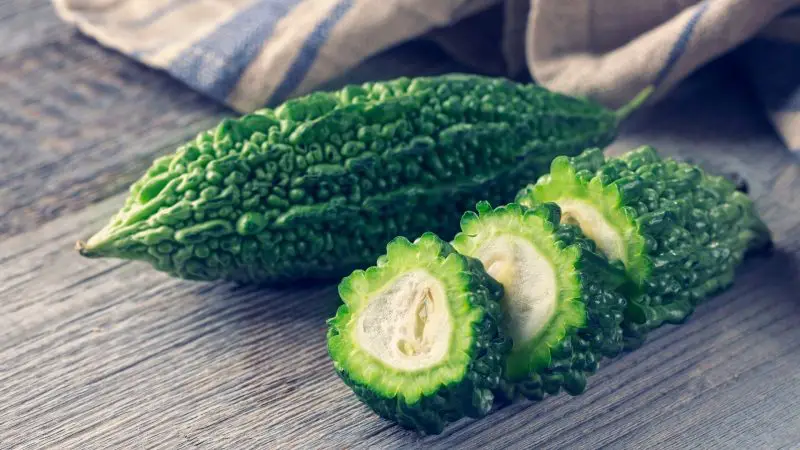
We don’t recommend feeding bitter melon to guinea pigs because of its bitter and alkaline taste that can be a little unpleasant. Also, bitterness can upset the guinea pig’s mouth and stomach. People tend to eat bitter melons cooked because cooking tames their bitter and strong flavor. But, as we already know, guinea pigs can’t eat any cooked food and this includes cooked bitter melon.
Can Guinea Pigs Eat Canary Melon?
Canary melon is an oval-shaped yellow melon with white to pale ivory-colored flesh and sweet taste, very similar to honeydew melon and cantaloupe, but also with a little tartness flavor. Guinea pigs can eat canary melon. This melon is also a good source of vitamins for guinea pigs, as it has important vitamin C and vitamin A. Feed canary melons to guinea pigs only in moderation and choose ones that are mature with bright yellow skin.
Can Guinea Pigs Eat Galia Melon?
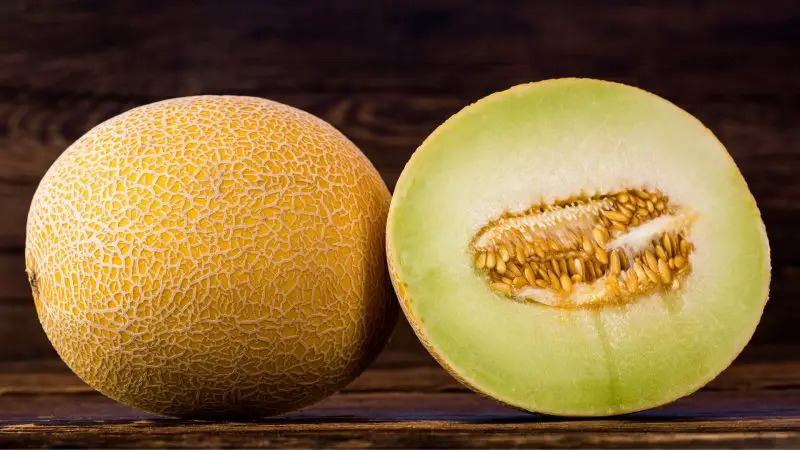
Galia melon or Sarda is a yellow to orange rounded melon with sweet but also aromatic taste and light green flesh. Guinea pigs can eat Galia melon, and this type of melon has many beneficial nutrients for them.
It’s full of vitamins, various minerals, low in fat and calories, and contains no cholesterol. However, you shouldn’t feed Galia melons to guinea pigs often. Always give them small serving sizes due to the calcium and sugar content in them.
Can Guinea Pigs Eat Winter Melon?
Winter melon has a specific taste. When immature, this fruit is sweet, but when it matures, it obtains a mild flavor. Guinea pigs can eat winter melon, as this melon has some potential health benefits for guinea pigs. It’s low in calories and fat and contains some essential vitamins and minerals. Also, because of calcium, sodium, and sugar content, winter melon needs to be fed only in moderation.
Can Guinea Pigs Eat Melon Seeds?
Guinea pigs shouldn’t eat melon seeds because these seeds are a choking hazard for them. This is why we recommend removing melon seeds before giving this fruit to guinea pigs, even if they are small and soft. Only then will you be sure that nothing will happen to your guinea pigs, and you can watch calmy how they enjoy eating melons.
Can Guinea Pigs Eat Melon Peel / Melon Skin?
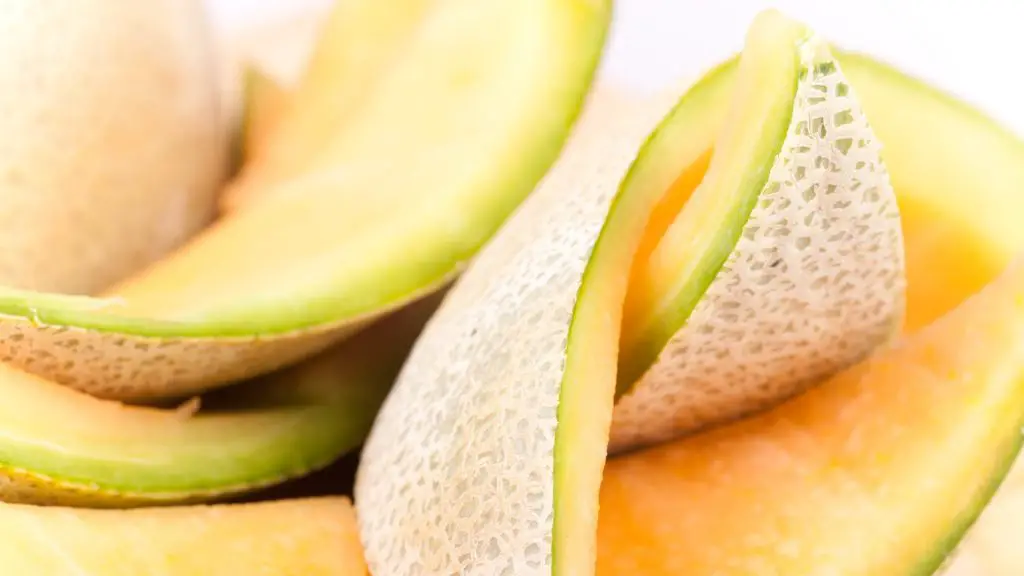
Guinea pigs love the flesh part of the melon without the seeds. Guinea pigs can sometimes chew on the melon skin as well. The skin of melon is not the nutrient-rich part, but it helps them keep their teeth in good shape and can prevent overgrowth of the teeth.
But, as we have already said, melon skin can contain some bacteria such as salmonella and pesticides, which can be very harmful to guinea pigs and even lead to death. So, if you’re willing to give them the melon peel, be sure to wash it thoroughly with water.
Honeydew melon skin or Galia melon skin is softer to guinea pigs and is easier to clean. However, you need to be careful with cantaloupe melon skin. This skin is problematic as it can contain more bacteria and pesticides due to the imperfections on the skin (rougher in texture).
Quick Facts on Melons
The following are some interesting facts on melons:
- Melons are in the same family as cucumbers and squashes.
- The origin of melons is in Africa and Asia (Southwestern parts).
- Melons were popular in Europe first, and then they were brought to America by Spanish travelers in the 16th century.
- The most popular melon types are honeydew, Persian, cantaloupe, and casaba.
- People in China consume the highest amount of melons out of all people in the world.
- Roasted melon seeds are a traditional snack in India and Africa, but are also eaten worldwide.
- Melons were even cultivated by the ancient Egyptians (2000 BC).
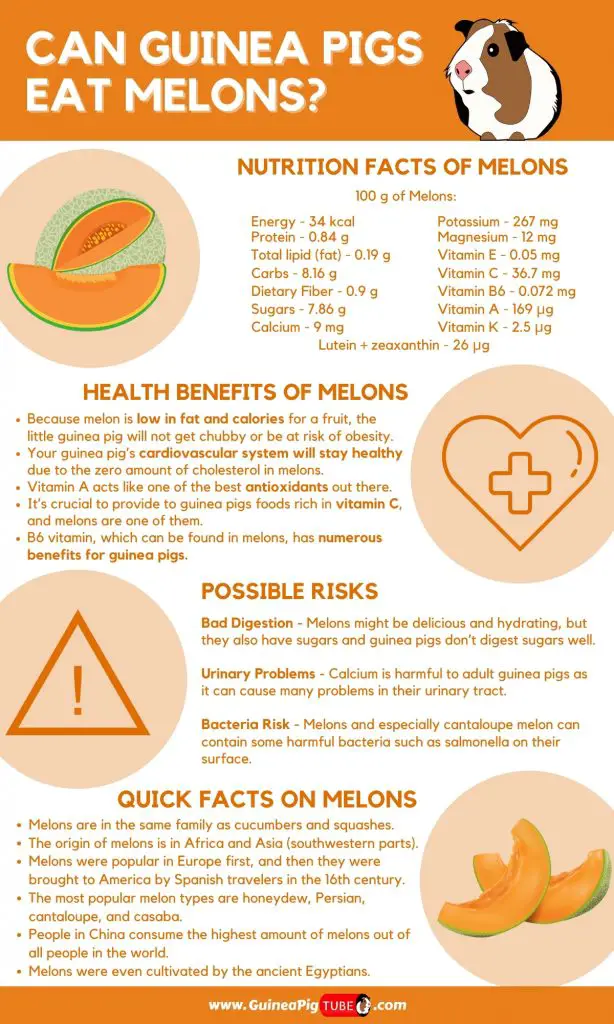
With food, you should be careful what to choose. If you are not sure what to feed them but believe your little piggies deserve some great treats, check our Helpful Guide to the Best Guinea Pig Treats to get some ideas.
List of Sources
Nutrient Requirements of Laboratory Animals: Fourth Revised Edition
The Effects of Diet on Anatomy, Physiology and Health in the Guinea Pig
